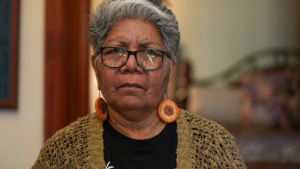It’s an inescapable reality of being a BIPOC: Sooner or later, someone will say something racially insensitive. It might be an innocent flub or an all-out mean-spirited dig, but you can be sure it will happen. And while minorities are often the unwitting recipients of ignorant, stereotypical commentary, the experience is inclusive of all races. It can happen on the playground, in the classroom, or in the workplace.
That’s where Minda Harts comes in. The corporate diversity trainer and author of The Memo: What Women of Color Need to Know to Secure a Seat at the Table has experienced her fair share of racially biased conversation as a young Black woman climbing the ranks in corporate America. “I had a manager who saw that I had on burnt-orange fingernail polish, and he said, ‘You people love your bright colors.’ And he joked around for 15 minutes about how Black people like bright colors,” recalls Harts. Even more embarrassing and degrading, her boss made the comments in front of her peer-level colleague.
Today, Harts is on a mission to stop bias with lots of straight talk from the top down. With America more divided than ever, conversations about race are necessary to heal, but Harts says there are six “greatest hits” of racist phrases to steer clear of. “I feel like a lot of people get an opportunity to try to take away another person’s dignity by saying certain things and having no accountability required,” she says. These are the phrases you should avoid to ensure that you’re not making this damaging mistake—and what you can say instead to get a conversation back on the right track. While you’re at it, learn these other small ways you can fight racism every day.
“You’re taking it the wrong way”
That nail polish diss from her boss put Harts in a tight spot. “That was early in my career, so I didn’t say anything back to him,” she recalls. “But had I said something to him, I knew I would’ve been met with, ‘You’re taking it the wrong way.’ It is hurtful—what other way am I supposed to take it? What way should you mean it?” It boils down to accountability. She explains that some White people, in particular, can feel as if they can say anything and that there doesn’t need to be a conversation about it afterward. And when one hurtful comment begets the next, the result is a losing game. “[If] I can never tell you, ‘I took offense to that,’ without being met with, ‘You’re taking this the wrong way,’ it’s not humanizing my experiences as a Black woman.” Here’s how to respond when someone makes a racist comment.
What to say instead: If you said something offensive, walk back the hurtful talk with a humble mea culpa. Harts suggests something like this: “What I said might have been offensive. Could you please explain to me how you interpreted what I said so I can better understand your point of view?”
“I’m not racist”
“That one is probably the most interesting one to me,” says Harts, “because it’s almost like a disclaimer for a lot of people.” She says the phrase often precludes a racist comment. “People shouldn’t say that because the person intentionally or unintentionally doing harm should not be able also to dictate what is racist and what isn’t,” she explains. “That’s one of the biggest issues in our country: Those who are causing the harm are also dictating what racism is.”
What to say instead: Drop the defensiveness and apologize. She offers this example: “I don’t consider myself to be racist, but perhaps what I said could have been said in a different way. I apologize if it came across that way.”
“Don’t play the race card”
“What does that even mean?” asks Harts. “It reminds me of another phrase people will say: ‘Bring your authentic self to work.’ If you want me to bring my authentic self to work, then that’s bringing my race to work, and if I’m being harmed in that way, then that’s my experience—this is not a game. It’s insensitive because that’s pretty much saying I don’t get to show up as who I am.”
What to say instead: Nothing. Zip it. “There is nothing else to replace this with,” warns Harts. “I would eliminate it completely. This statement tries to erase someone else’s identity.” These are just a few everyday acts of racism that don’t get talked about enough.
“Race has nothing to do with it”
Don’t even go there, because that’s hardly ever the case, explains Harts. Plus, there’s a larger problem here. “All of these phrases are embedded in systemic racism, so even just saying this perpetuates systemic racism. It’s reaffirming the problem,” she says. “When you say race has nothing to do with it, you are again dismissing people’s experiences. And two things can be true at the same time: You may not experience racism in the workplace, but somebody else might, so you still can’t dictate if that happened to them or not.”
What to say instead: “My intention was not to erase your experience; I apologize for using such harmful language.” Your statement should show your sensitivity to the other person’s experiences.
“I have Black friends”
Harts says this one is particularly ridiculous. Just because you have a Black or other minority pal, family member, or colleague, it doesn’t remove you from making racially biased comments. “Do you have a relationship with them? Are you an ally of that person? Do you have a real relationship with them? Are you showing up for them? Are you voting with their interest in mind? Just because you know someone who happens to be Black or a POC, [you’re not] exempt from participating in systems of oppression,” she says.
What to say instead: “I wasn’t aware of how what I said came off. I apologize. This is something I will bring up with my friends so I can better understand how some of the language I’m using could be harmful to others.” Read the story of how it took one woman 34 years to realize she was racist.
“I’m color-blind”
The irony of this comment isn’t lost on Harts. Many people clinically diagnosed with color blindness can still see some color. “As a person of color, we want you to see us, and I think that’s the issue—not being seen, being these invisible, hidden figures as if we’re not human like everybody else,” she explains. “When you say, ‘I don’t see color,’ you’re choosing not to see me in my experiences.”
What to say instead: Harts suggests acknowledging and affirming a person’s identity and experiences with a comment like this: “I was raised not to see color, but now I understand how harmful that statement can be to someone who takes pride in their identity. We should all take pride in our differences—that’s what makes this country great.”
An important guideline
Harts says empathy should be at the foundation of whatever you say and what she has suggested here. “When we are able to have courageous conversations,” she says, “we are able to be courageous listeners and hear each other out.” It’s also a good idea to educate yourself as much as possible. These podcasts about race are a good start.
For more on this important issue, see our guide to the Fight Against Racism.




